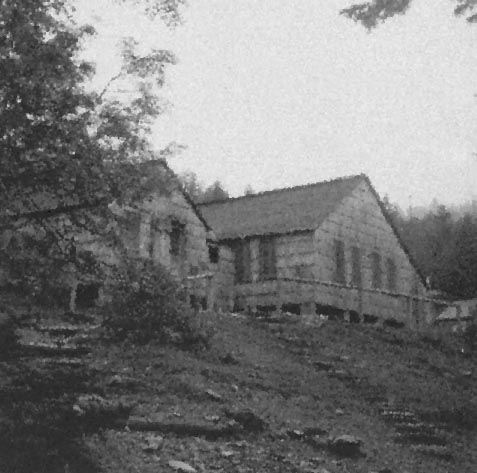|

I started reading Monteiths Mountains yesterday. It's a grabber. Great style and management. I really like it!
--E.N.
Genovese; Professor & Chair / Department of
Classics ~ San Diego State University
Ten pages into the book,
I found myself saying, "Geez, Skip can really write." Twenty pages into the book, I thought, "Geez, he really can capture
a mood of time and place." Thirty pages into the book, I concluded he can tell one hell of a story. I enjoyed it tremendously.
Please pass-on my congratulations for having written one heck of a novel!
--Eugene B. Cooper, Professor Emeritus;
University
of Alabama-Tuscaloosa and Consulting Professor
[Retired]; Nova Southeastern University ~ Fort
Lauderdale,
Florida
Ohmygod! I failed to get my mail out of the box yesterday - opened the box this morning on my way out
to work -- and THERE IT WAS! A package containing Monteith's Mountains!! I drove to the jobsite like a madwoman, entered my
office, threw my stuff down, sat at my desk, and gleefully cut open the package. I lovingly examined the book, read the flysheets
and the back. Then I opened it and began to read -- and it is now 10:30 am and I haven't even taken the messages off my Voicemail!
I'm no book reviewer, but I know what's good when I read it. Great characters, excellent dialog, wonderful descriptions!
--Dr.
Ann Shockley; Chief of Medical Staff; Caustic
for Senate Virtual Campaign ~ Pittsburgh PA
In short, we love
Monteith's Mountains. Great characters, outrage, humor, and storytelling. Not only does the author say the right thing, he
also leaves the right things unsaid, letting the reader develop the total scene without intrusion. I'm recommending this novel
to family and friends, and many of them will be getting it as a Christmas present.
And it would make a damn good movie,
except I don't want my personal visions replaced by Hollywood effects.
--Ian and Milla Stockton; Security Consultants
~
Columbia, South Carolina
Began Monteith's Mountains late afternoon yesterday and could not put it down.
My eyes gave out on page 223, and I just finished it this evening. This is an extraordinary work. You have made the Smokies
and its people come to life. Congratulations on a truly impressive piece of history. I don't mean to embarrass you, but I'm
mighty proud to know such a creative, profound and interesting S.O.B.
--Dr. Bob Hieronymus; Writer, Painter, Musician,
Radio Personality; Co-Founder of 21st Century
Radio heard every Sunday Night on WCBM-AM in
Baltimore, Md. and
at www.21stcenturyradio.com
This is a terrific read. It's set in the Smoky Mountains in the early part of the
century and the author talks in pictures. It's like a girlfriend of mine once said about a singer that I introduced her to
by giving her one of his albums said of the album, "He's so visual!" The author's characters are well fleshed out and believable.
Take it from someone who discovered Jack London when he entered the fifth grade and finished everything that London had written
by the end of the school year, this is a must read.
-Raiford Pittman; Attorney, String Musician - Como,
Mississippi
Brooks
makes his villian/victim as scary as Hannibal Lector and, and if anything, more believable. Walker Tom Monteith is like a
wild animal -- beautiful, but dangerous. The background of the southern Appalachians at the beginning of industrialization
is almost as scary as the fictional serial killer plot -- and it's real. You understand why the characters act the way they
do, but at the end you feel that we've all been lucky to survive.
--A reader; Asheville, North Carolina
Although
I enjoy all books with an Appalachian theme, I especially enjoyed learning some fascinating facts about logging in the Smokey
Mountains from Skip Brooks' book. The book is full of Appalachian culture and mystery. Even though a serial killer stalks
the book, the violence is kept in its proper place (not too much gore). The characters and plot line kept me reading long
past bedtime.
--Donna Warmuth; Boone, North Carolina
 Intriguing story is all I can say. This story has a number of different angles that make it so interesting.It
not only gives us an opening into a killer's mind but to his history as well. It is a great Appalachian murder mystery.
--Review / Barnes & Noble.com
As a native of the area that is the book's setting, it's particular intriguing
to read about things that happened -- and may have happened -- in your own stomping ground. The hunt(s) pull you through;
the characters stay with you even after the book is closed; the setting gives you a feel for the life your ancestors must
have lived.
--Review / Barnes & Noble.com
Skip Brooks's "Monteith's Mountains: Death Stalks the Southern Appalachians" covers a lot of ground; its range deals
with a crucial time in Appalachian history, the development of the logging industry, and multiple individual stories -- stories
of self-exploration and self-discovery.
Against the sublime backdrop of the rolling Great Smoky Mountains, themselves a powerful presence throughout the novel,
Brooks artfully crafts his tale, seamlessly interweaving history with narrative and bringing to life an era long gone. Long
before the Blue Ridge Parkway, the Appalachian mountains were a place where beauty and terror coexisted. The laws of humankind
did not apply. It is into this surreal world that Brooks introduces the character of Walker Tom Monteith, a serial killer
who hears the voice of Jesus.
Born to Black John Walker, a fiery preacher who had multiple wives and founded his own colony with his extensive family,
Walker Tom Monteith was one of his many children. At a young age, Walker Tom experiences a "communion" with Jesus; blessed
with what he interprets as a divine connection, Walker Tom proceeds to carry out his bloody path in life. He is a being without
conscience, lurking in the darkness and luring his guileless victims towards their demise by preying on their weak human natures.
The other characters in the novel also play integral roles. Two primary characters are Taylor Henry and David Brant. Taylor,
a small woman with tremendous business sense and a quest to fulfill her destiny in the Great Smokies, is a major player in
the narrative structure. Her love for Brant, a half-Indian on his own spiritual quest -- and fleeing the wrath of Walker Tom
after witnessing the latter commit murder -- gives a fairy tale quality to the story. And, as with many fairy tales, the narrative
comes full circle in the end. Brant, representing the emerging world that created the Great Smoky Mountains we know and treasure
today, is pitted against Walker Tom, a violent symbol of the era when no rules could exist within the mountain world and an
individual lived by their own morals and convictions. The novel's ending juxtaposes the two sides to the personality of the
Appalachians and leaves the reader with an appreciation of their solemn magnificence as well as the dangers hidden beneath
the foliage.
Guaranteed to intrigue, Monteith's Mountains is an interesting sojourn through the Appalachians of a century ago and into
the lives of the people who braved to make a life amidst their savage beauty.
--L.
Lyda; Boone, N.C.
|

